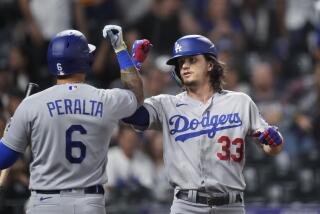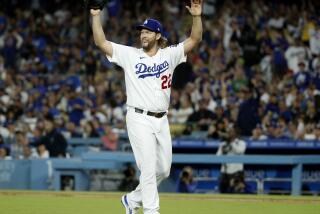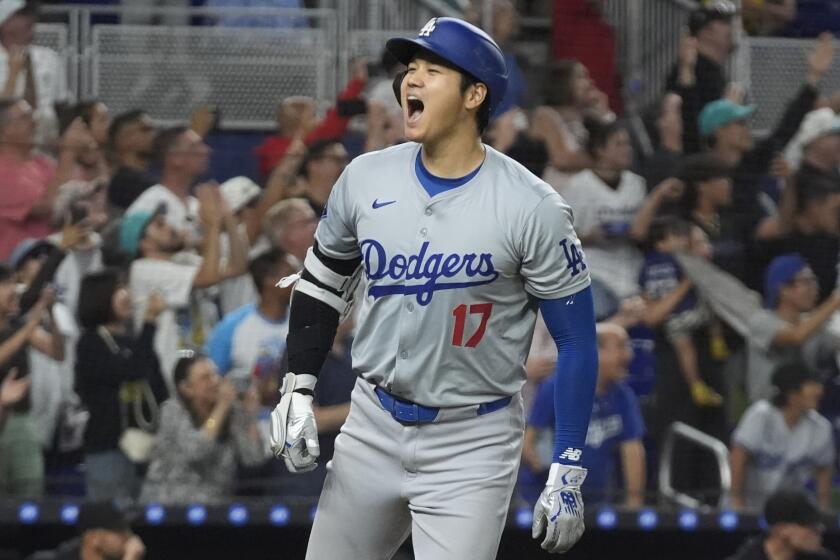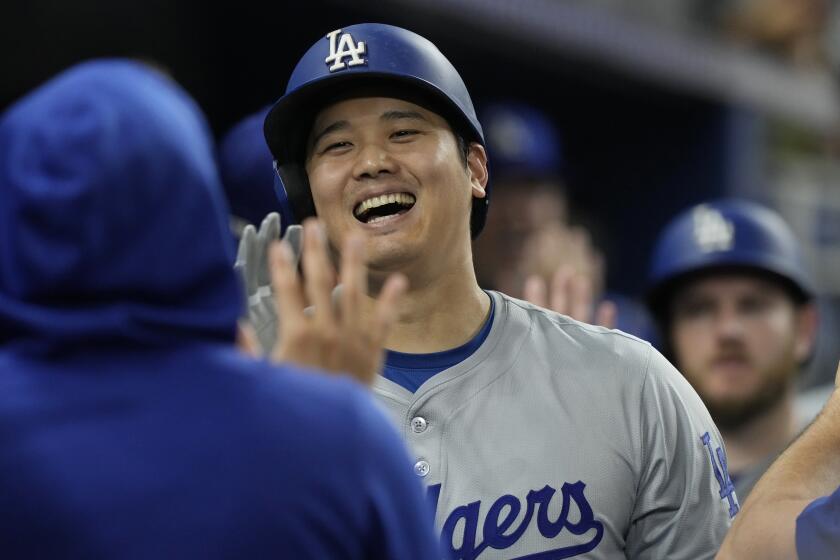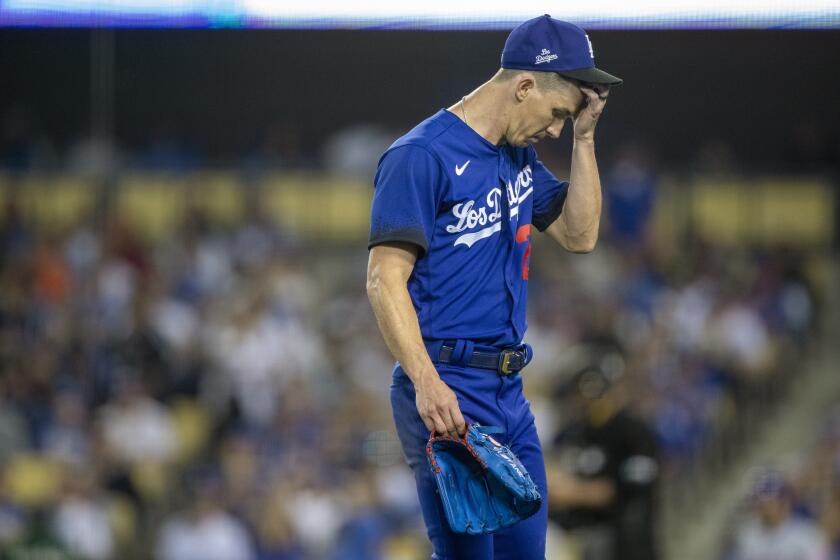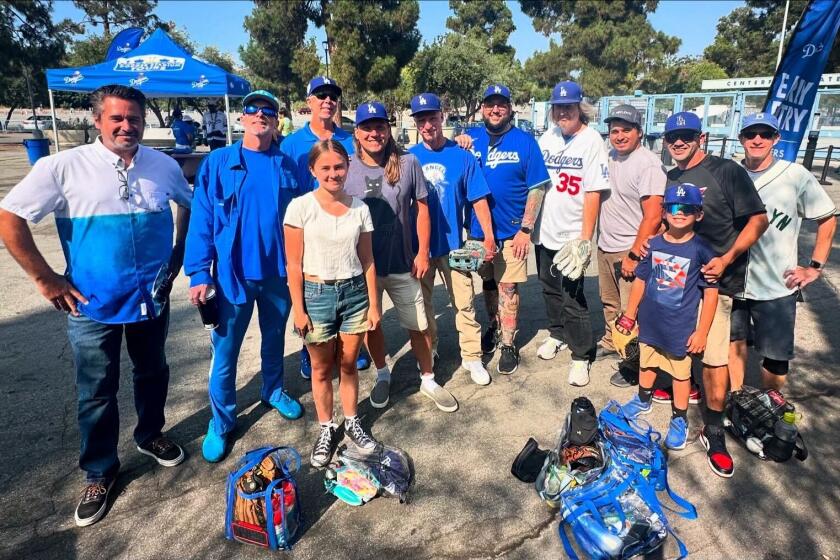A look at the Dodgers’ World Series history
A look at each of the Dodgers’ World Series appearances, from Brooklyn to Los Angeles.
1916: Boston Red Sox 4, Brooklyn Robins 1
Game 1—Red Sox 6, Robins 5
Game 2—Red Sox 2, Robins 1 (14)
Game 3—Robins 4, Red Sox 3
Game 4—Red Sox 6, Robins 2
Game 5—Red Sox 4, Robins 1
Boston’s pitching was just too much for the Robins (named for their manager, Wilbert Robinson). Babe Ruth, Ernie Shore and Dutch Leonard combined to go 4-0 with a 1.11 ERA. Larry Gardner hit a key three-run inside-the-park home run in the Game 4 victory. As a team, the Robins hit only .200 and scored only 13 runs in the five games.
Memorable moment: Babe Ruth’s 14-inning complete game in Game 2.
Pitching stars: Ruth giving up only one run and six hits in 14 innings. Ernie Shore went 2-0 with an 0.53 ERA.
Batting stars: Boston’s Duffy Lewis hit .353, Harry Hooper hit .333 and scored six runs and Gardner, while hitting only .176, had two homers and six RBIs. For the Robins, Casey Stengel hit .364.
1920: Cleveland Indians 5, Brooklyn Robins 2
Game 1—Indians 3, Robins 1
Game 2—Robins 3, Indians 0
Game 3—Robins 2, Indians 1
Game 4—Indians 5, Robins 1
Game 5—Indians 8, Robins 1
Game 6—Indians 1, Robins 0
Game 7—Indians 3, Robins 0
One of the rare nine-game World Series. This Series featured the only World Series triple play, the first World Series grand slam (Cleveland’s Elmer Smith) and the first World Series home run by a pitcher (Cleveland’s Jim Bagby). All three of those things happened in Game 5. This was the last World Series until 1980 to feature two teams that had never won the title.
Memorable moment: Cleveland second baseman Bill Wambsganss turns an unassisted triple play in Game 5.
Pitching stars: Stan Coveleski pitched three complete games, giving up a total of two runs and 15 hits. Brooklyn’s Sherry Smith was their standout, going 1-1 with an 0.53 ERA in two starts.
Batting stars: Cleveland’s Charlie Jamieson and Steve O’Neill hit .333. Tris Speaker hit .320 with six runs scored. Elmer Smith was Cleveland’s RBI leader with five. For the Robins, future Hall of Famer Zack Wheat hit .333.
1941: New York Yankees 4, Brooklyn Dodgers 1
Game 1--Yankees 3, Dodgers 2
Game 2--Dodgers 3, Yankees 2
Game 3--Yankees 2, Dodgers 1
Game 4--Yankees 7, Dodgers 4
Game 5--Yankees 3, Dodgers 1
This Series is remembered for one thing — Dodger catcher Mickey Owen’s dropped third strike in Game 4. But Yankee pitching dominated. Three Yankee starters hurled complete-game wins, with each giving the Dodgers only one earned run. Forgotten about this Series, and just as damaging to the Dodgers as Owen’s blunder: Freddie Fitzsimmons was sailing along in Game 3, shutting out the Yankees, when the final out of the seventh — a line drive by Marius Russo — bounced off Fitzsimmons’ leg, breaking his kneecap. Hugh Casey, who replaced Fitzsimmons in the eighth, promptly gave up two runs and lost the game. In Game 4, Brooklyn held a 4-3 lead with two out in the top of the ninth. Casey, who had shut out the Yankees since coming on in the fifth inning, then struck out Tommy Henrich for what should have been the game-ending out. But Owen let the ball get by him, and before the third out was recorded Casey had given up a single, two doubles, and two walks — and four runs as Brooklyn went on to lose its third game.
Memorable moment: Owen’s dropped third strike.
Pitching stars: Yankee starters Tiny Bonham, Red Ruffing and Russo all went 1-0, holding the Dodgers to one earned run each.
Batting stars: Yankee second baseman Joe Gordon hit .500 with five RBIs. Outfielder Charlie Keller also drove in five runs.

1947: New York Yankees 4, Brooklyn Dodgers 3
Game 1--Yankees 5, Dodgers 3
Game 2--Yankees 10, Dodgers 3
Game 3--Dodgers 9, Yankees 8
Game 4--Dodgers 3, Yankees 2
Game 5--Yankees 2, Dodgers 1
Game 6--Dodgers 8, Yankees 6
Game 7--Yankees 5, Dodgers 2
Two of the most memorable plays in baseball history brought the Dodgers wins in Game 4 and 6, but the Yankees stood tall when the Series ended. In Game 4, Yankee pitcher Bill Bevens, although he averaged a walk an inning, had allowed no Dodger hits and only one run entering the last of the ninth. Bevens retired two in the ninth, but walked his ninth and 10th batters (one intentionally), then lost both his no-hitter and the game as Dodger pinch-hitter Cookie Lavagetto doubled home Spider Jorgensen and Eddie Miksis to even the Series at 2-2. The Yankees won Game 5, but the Dodgers won a dramatic Game 6. The Dodgers built an early 4-0 lead, but the Yankees took the lead in the fourth. The Dodgers regained the lead, 8-5, in the sixth, but with two on in the bottom of the inning, Joe DiMaggio hit a long fly to left that looked like a sure homer. Left fielder Al Gionfriddo — in what turned out to be his last major league game — raced to the bullpen fence (415 feet from home plate) to rob DiMaggio of the home run. New York scored a run in the ninth, but thanks to Gionfriddo’s catch it was not enough to win the game. In Game 7, the Yankees won, 5-2.
Memorable moment: DiMaggio kicking at the infield dirt after Gionfriddo’s catch, a rare on-field show of emotion by DiMaggio.
Pitching stars: Spec Shea was 2-0 with a 2.35 ERA in two starts for the Yankees. Hugh Casey was 2-0 with one save in six relief appearances for the Dodgers.
Batting stars: Joe DiMaggio hit two homers but batted only .231 for the Yankees. Outfielder Johnny Lindell led New York with seven RBIs, hitting .500. Pee Wee Reese hit .304 with four RBIs for the Dodgers.
1949: New York Yankees 4, Brooklyn Dodgers 1
Game 1--Yankees 1, Dodgers 0
Game 2--Dodgers 1, Yankees 0
Game 3--Yankees 4, Dodgers 3
Game 4--Yankees 6, Dodgers 4
Game 5--Yankees 10, Dodgers 6
New York and Brooklyn traded 1-0 wins to begin the Series. The teams entered the ninth inning of Game 3 tied, 1-1. But in the top of the ninth, Dodger starter Ralph Branca, after loading the bases on two walks and a single, gave up another single to pinch-hitter Johnny Mize for two runs. Jerry Coleman drove in another run before the third out was made. In the last of the ninth, Yankee closer Joe Page gave up homers to Luis Olmo and Roy Campanella, but struck out pinch-hitter Bruce Edwards for New York’s second win. The Yankees then easily won Games 4 and 5.
Memorable moment: Not many, the Yankees dominated.
Pitching star: Allie Reynolds was 1-0 with a 0.00 ERA in two games for the Yankees.
Batting stars: Third baseman Bobby Brown hit .500 and led the Yankees with five RBIs. Gil Hodges led the Dodgers with four RBIs.
1952: New York Yankees 4, Brooklyn Dodgers 3
Game 1--Dodgers 4, Yankees 2
Game 2--Yankees 7, Dodgers 1
Game 3--Dodgers 5, Yankees 3
Game 4--Yankees 2, Dodgers 0
Game 5--Dodgers 6, Yankees 5
Game 6--Yankees 3, Dodgers 2
Game 7--Yankees 4, Dodgers 2
The teams combined for 16 home runs. In Game 7, the score was tied, 2-2, in the sixth inning when Mickey Mantle homered off Dodger starter Joe Black for what proved to be the Series decider, as three Yankee relievers held Brooklyn scoreless through the final four innings.
Memorable moment: In the eighth inning of Game 6, Mantle hit the first of his record 18 World Series homers. That, too, provided the difference in the Yankees’ 3-2 win.
Pitching stars: Yankee starter Vic Raschi was 2-0 with a 1.59 ERA. Allie Reynolds won the other two games, and earned a save in Raschi’s Game 6 victory.
Batting stars: Mantle hit .345 with two homers and three RBIs, while Yankee first baseman Johnny Mize hit .400 with three homers and six RBIs. Duke Snider hit .345 with four homers and eight RBIs for the Dodgers.
1953: New York Yankees 4, Brooklyn Dodgers 2
Game 1--Yankees 9, Dodgers 5
Game 2--Yankees 4, Dodgers 2
Game 3--Dodgers 3, Yankees 2
Game 4--Dodgers 7, Yankees 3
Game 5--Yankees 11, Dodgers 7
Game 6--Yankees 4, Dodgers 3
The Yankees won a record fifth consecutive World Series title despite being outhit by the Dodgers, .300 to .279. Dodger ace Carl Erskine lasted only one inning of the opener, giving up three walks and two triples for four Yankee runs. The Dodgers outhit New York in Game 2, and held a 2-1 lead entering the bottom of the seventh, but Billy Martin tied the score with a leadoff homer, and Mickey Mantle won it with a two-run blast in the eighth. The Dodgers won Games 3 and 4 to even the Series, as Erskine set a record with 14 strikeouts in Game 3, but the Yankees never trailed while winning Games 5 and 6, winning the final game on Martin’s single in the bottom of the ninth.
Memorable moment. Erskine’s 14 strikeouts in Game 3.
Pitching stars: Yankee starter Ed Lopat was 1-0 with a 2.00 ERA, while Allie Reynolds won one game and saved another.
Batting stars: Martin hit .500 and set a six-game Series record with 12 hits. He also had one double, two triples, two homers and drove in eight runs. Mickey Mantle had two homers and seven RBIs. For the Dodgers, Duke Snider hit .320 with five RBIs.

1955: Brooklyn Dodgers 4, New York Yankees 3
Game 1--Yankees 6, Dodgers 5
Game 2--Yankees 4, Dodgers 2
Game 3--Dodgers 8, Yankees 3
Game 4--Dodgers 8, Yankees 5
Game 5--Dodgers 5, Yankees 3
Game 6--Yankees 5, Dodgers 1
Game 7--Dodgers 2, Yankees 0
In their sixth Series matchup in 15 years, the Dodgers finally beat the Yankees. The Dodgers dropped the first two games, but won the next three in Brooklyn. In Game 3, Johnny Podres held the Yankees to three runs, one of them a homer by Mickey Mantle, who appeared in only three games because of a leg injury. Home runs by Roy Campanella, Gil Hodges and Duke Snider accounted for six of Brooklyn’s eight runs in Game 4 and Snider had two homers in the Game 5 win. The Yankees took Game 6, scoring all five of their runs in the first inning. In Game 7, Gil Hodges drove in two Brooklyn runs with a single in the fourth and a sacrifice fly in the sixth and that was enough as left fielder Sandy Amoros stopped New York’s only scoring threat with a spectacular running catch in the sixth that started a double play and preserved Podres’ second win.
Memorable moment: The Boys of Summer finally win one.
Pitching stars: Podres, who was 2-0, giving up two runs in 18 innings. Clem Labine and Roger Craig had the other Dodger victories. Whitey Ford was 2-0 for the Yankees.
Batting stars: Snider hit .320 with four homers and seven RBIs. Hodges drove in five runs. Billy Martin led the Yankees, hitting .320 with four RBIs.
1956: New York Yankees 4, Brooklyn Dodgers 3
Game 1--Dodgers 6, Yankees 3
Game 2--Dodgers 13, Yankees 8
Game 3--Yankees 5, Dodgers 3
Game 4--Yankees 6, Dodgers 2
Game 5--Yankees 2, Dodgers 0
Game 6--Dodgers 1, Yankees 0
Game 7--Yankees 9, Dodgers 0
The baseball world returned to normal as the Yankees won the World Series. This time, the Yankees lost the first two games, won the next three. This Series will always be remembered for Game 5, Yankee pitcher Don Larsen’s perfect game. Game 7 was a disaster for the Dodgers. Don Newcombe gave up two two-run homers to Yogi Berra and a solo shot to Elston Howard. Bill Skowron hit a grand slam in the seventh off of Roger Craig as the Yankees won, 9-0.
Memorable moment: Larsen striking out Dale Mitchell to complete his perfect game.
Pitching star: Larsen
Batting stars: Berra hit .360 with three homers and 10 RBIs. Mickey Mantle hit three homers. For the Dodgers, Gil Hodges hit .304 and drove in eight runs.
1959: Dodgers 4, Chicago White Sox 2
Game 1—White Sox 11, Dodgers 0
Game 2--Dodgers 4, White Sox 3
Game 3--Dodgers 3, White Sox 1
Game 4—Dodgers 5, White Sox 4
Game 5—White Sox 1, Dodgers 0
Game 6—Dodgers 9, White Sox 3
The Dodgers win the World Series in their second season in Los Angeles. Also, this is the only World Series to be played between 1949 and 1964 where no games were played in New York. It is also the first World Series where neither side had a complete game from a pitcher. After the White Sox won in a rout in Game 1, the Dodgers’ pitching took over, with the White Sox winning a 1-0 Game 5 squeaker with the only run coming on a double play grounder against Sandy Koufax. Games 3, 4 and 5, played at the Coliseum, are the only World Series games to draw more than 90,000 fans.
Memorable moment: Chuck Essegian’s two pinch-hit homers, a World Series record. He hit only one home run during the season.
Pitching star: Larry Sherry went 2-0 with two saves to lead the Dodgers.
Batting stars: Gil Hodges hit .391 and Charlie Neal hit .370 with two doubles, two homers and six RBIs for the Dodgers. Ted Kluszewski of the White Sox hit .391 with three homers and 10 RBIs.
1963: Dodgers 4, New York Yankees 0
Game 1—Dodgers 5, Yankees 2
Game 2--Dodgers 4, Yankees 1
Game 3--Dodgers 1, Yankees 0
Game 4—Dodgers 2, Yankees 1
Often voted among the top three moments in Dodger history, this is the only time the Dodgers have won the deciding World Series game at Dodger Stadium. The Dodgers used only four pitchers in the Series: Sandy Koufax, Don Drysdale, Johnny Podres and Ron Perranoski. They held the Yankees to four runs and a .171 team batting average. It was the first time the Yankees had ever been swept in a World Series. The Yankees never had the lead at any point in any game of the Series.
Memorable moment: Sandy Koufax strikes out a then-World Series record 15 Yankees in Game 1.
Pitching star: Koufax struck out 23 Yankees in two complete game victories.
Batting stars: Tommy Davis of the Dodgers hit .400 with two triples. Moose Skowron, John Roseboro and Willie Davis each had three RBIs.

1965: Dodgers 4, Minnesota Twins 3
Game 1—Twins 8, Dodgers 2
Game 2—Twins 5, Dodgers 1
Game 3--Dodgers 4, Twins 0
Game 4—Dodgers 7, Twins 2
Game 5—Dodgers 7, Twins 0
Game 6—Twins 5, Dodgers 1
Game 7—Dodgers 2, Twins 0
Sandy Koufax did not pitch in Game 1 because of the Jewish holiday Yom Kippur. Don Drysdale started in his place and gave up seven runs in 2 2/3 innings. When manager Walter Alston came to the mound to replace him, Drysdale said, “I bet right now you wish I was Jewish, too.” After the Twins won the first two games, Dodger pitching took over, holding Minnesota to just seven runs over the last five games, with five of those coming in the Twins’ Game 6 victory.
Memorable moment: Sandy Koufax comes back on two days’ rest to shut out the Twins in Game 7.
Pitching star: In three starts, Koufax went 2-1 with an 0.38 ERA and 29 strikeouts in 24 innings.
Batting stars: Ron Fairly of the Dodgers hits .370 with two homers and six RBIs. Lou Johnson also had two homers and Maury Wills hit .367 with three stolen bases. For the Twins, Harmon Killebrew hit .286 with a homer and Zoilo Versalles hit .286 with a double, triple and home run.
1966: Baltimore Orioles 4, Dodgers 0
Game 1—Orioles 5, Dodgers 2
Game 2—Orioles 6, Dodgers 0
Game 3—Orioles 1, Dodgers 0
Game 4—Orioles 1, Dodgers 0
Orioles pitching dominated the Dodger offense, which scored only two runs in the whole series, and none after they scored a run in the third inning of Game 1. Dodger futility in the field was best encapsulated by Dodgers outfielder Willie Davis, who committed three errors in the fifth inning of Game 2, losing one ball in the sun, dropping another and throwing another away. The Dodgers became the third team to make six errors in one World Series game. Game 2 was also the final game of Sandy Koufax’s career. He retired afterward because of an arthritic left elbow. He was only 30.
Memorable moment: At the age of 21, Jim Palmer becomes the youngest player to pitch a shutout in a World Series.
Pitching stars: In two starts, Dave McNally went 1-0 with a 1.59 ERA. Moe Drabowsky pitched 6 2/3 innings of scoreless relief in Game 1, striking out 11 Dodgers and allowing only one hit.
Batting stars: Frank Robinson of the Orioles hit .286 with two homers and Boog Powell hit .357.

1974: Oakland Athletics 4, Dodgers 1
Game 1—A’s 3, Dodgers 2
Game 2—Dodgers 3, A’s 2
Game 3—A’s 3, Dodgers 2
Game 4—A’s 5, Dodgers 2
Game 5—A’s 3, Dodgers 2
The first all-California World Series was closer than the final outcome indicated, as four of the games were decided by one run. The Game 5 win gave the A’s their third consecutive title, the first team to do that since the Yankees won five in a row from 1949-53. The A’s won the Series despite batting only .211 in the Series, the lowest in a five-game Series since the Orioles hit .146 in 1969.
Memorable moment: In Game 1, right fielder Joe Ferguson cuts in front of teammate Jimmy Wynn, who had a much weaker arm, to catch a fly ball hit by Reggie Jackson. Ferguson then threw a 320-foot strike to catcher Steve Yeager, who blocked the plate and tagged out Sal Bando, who was trying to score from third.
Pitching stars: Oakland’s Rollie Fingers appeared in four of the five games and went 1-0 with two saves. Don Sutton got the lone win for the Dodgers.
Batting stars: Oakland’s Joe Rudi hit .333 with a home run and led all batters with four RBIs. Steve Garvey hit .381 for the Dodgers.
1977: New York Yankees 4, Dodgers 2
Game 1—Yankees 4, Dodgers 3 (12)
Game 2—Dodgers 6, Yankees 1
Game 3—Yankees 5, Dodgers 3
Game 4—Yankees 4, Dodgers 2
Game 5—Dodgers 10, Yankees 4
Game 6—Yankees 8, Dodgers 4
This is the Series that cemented the legend of Reggie Jackson, when he homered off of Burt Hooton, Elias Sosa and Charlie Hough in the Series-clinching Game 6. Despite losing the series, the Dodgers outscored the Yankees, 28-26. This is also the first World Series the Yankees won after George Steinbrenner bought the team earlier in the decade.
Memorable moment: Reggie Jackson slams home runs in three consecutive at-bats against three consecutive pitches from three different pitchers.
Pitching star: Ron Guidry gave up two runs and four hits in his lone start, a complete-game victory.
Batting stars: Jackson hit .450 with five homers and eight RBIs. He also scored 10 runs. Thurman Munson hit .320 with two doubles and a homer. For the Dodgers, Steve Garvey hit .375 with a double, triple and homer and Reggie Smith hit .273 with three homers and five RBIs.
1978: New York Yankees 4, Dodgers 2
Game 1—Dodgers 11, Yankees 5
Game 2—Dodgers 4, Yankees 3
Game 3—Yankees 5, Dodgers 1
Game 4—Yankees 4, Dodgers 3 (10)
Game 5—Yankees 12, Dodgers 2
Game 6—Yankees 7, Dodgers 2
This was the Graig Nettles defensive clinic series, as the Yankees third baseman saved several runs with outstanding backhanded grabs and long throws to retire runners. In Game 3, the Dodgers had Bill North on third when Davey Lopes hit a hard liner that Nettles grabbed to save a run. Reggie Smith hit a hard grounder down the line that Nettles snared and threw to first to get Smith. In the fifth, the Dodgers had runners on first and second with two out when Smith hit another sharp grounder. Nettles snared it and prevented at least one run from scoring. The next batter, Steve Garvey, hit a shot to almost the same place, but Nettles grabbed it and threw to second for the force play and third out. The Dodgers loaded the bases with two out in the sixth, but Nettles made a diving stop of a ball hit by Lopes and threw to second for a force to end the inning.
Memorable moment: Rookie Bob Welch is brought in in the ninth inning of Game 2 to preserve a 4-3 lead. WIth two out and two men on, he runs the count to 3-and-2 on Reggie Jackson. Jackson proceeds to foul off several pitches before Welch gets him to swing and miss a fastball.
Pitching star: Ron Guidry, who went 25-3 on the season, gave up one run and struck out four in a complete-game victory in Game 3.
Batting stars: Bucky Dent hit .417 with seven RBIs for the Yankees. Brian Doyle, a late-season callup to replace injured Yankees second baseman Willie Randolph, hit .438. Old nemesis Reggie Jackson hit .391 with two homers and eight RBIs. For the Dodgers, Davey Lopes hit .308 with three homers and seven runs scored and Bill Russell hit .423.
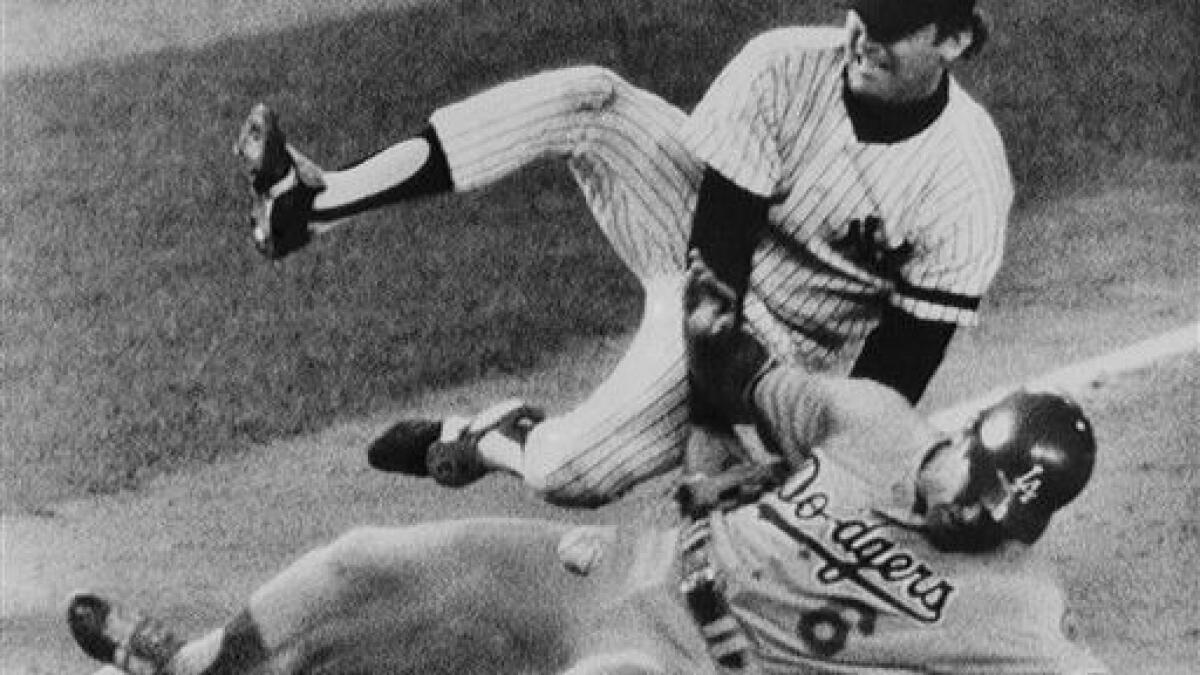
1981: Dodgers 4, New York Yankees 2
Game 1—Yankees 5, Dodgers 3
Game 2—Yankees 3, Dodgers 0
Game 3—Dodgers 5, Yankees 4
Game 4—Dodgers 8, Yankees 7
Game 5—Dodgers 2, Yankees 1
Game 6—Dodgers 9, Yankees 2
The Garvey-Lopes-Russell-Cey infield finally won a World Series in their final year together. It marked the 11th time the Yankees and Dodgers have played in the World Series, and the final time to date. The season was split into two halves because of a players’ strike, necessitating an extra round of playoffs to get to the World Series. There were three World Series MVPs named for the first time, all Dodgers: Ron Cey, Pedro Guerrero and Steve Yeager.
Memorable moment: In the year of Fernandomania, Dodgers manager Tommy Lasorda just couldn’t bring himself to take out Fernando Valenzuela in a game in which he was clearly struggling. Valenzuela rewarded his manager by getting a complete-game victory despite giving up four runs, nine hits and walking seven.
Pitching stars: Burt Hooton had a 1.59 ERA in two starts for the Dodgers while closer Steve Howe went 1-0 with a save. Tommy John of the Yankees went 1-0 with an 0.69 ERA in two starts.
Batting stars: Steve Garvey hit .417 for the Dodgers. Cey hit .350 with six RBIs, Guerrero .333 with two homers and seven RBIs and Yeager hit .286 with two homers. Reggie Jackson hit .333 with a homer for the Yankees.
1988: Dodgers 4, Oakland Athletics 1
Game 1—Dodgers 5, A’s 4
Game 2—Dodgers 6, A’s 0
Game 3—A’s 2, Dodgers 1
Game 4—Dodgers 4, A’s 3
Game 5—Dodgers 5, A’s 2
Much like the 2018 Dodgers against the Boston Red Sox, the 1988 Dodgers were matched up against a team that was the supposed class of baseball, a team that was supposed to steamroll the Dodgers. Instead, Game 1 featured Kirk Gibson, hobbled on two injured legs, dramatically coming off the bench in the ninth inning to hit a game-winning two-run pinch-hit homer. Game 2 featured Cy Young winner Orel Hershiser holding the A’s to three hits in a shutout. It was all downhill from there for the A’s, who were defeated in five games in one of the biggest upsets in baseball history.
Memorable moment: “In a year that has been so improbable... the impossible has happened!” — Vin Scully after Gibson’s homer. Or, if you want to ignore the Gibson homer, how about Mickey Hatcher sprinting around the bases after his two homers, like he was afraid they were going to call him out before he got to home plate.
Pitching star: Orel Hershiser went 2-0 with an ERA of 1.00 and 17 strikeouts in 18 innings.
Batting stars: Hatcher hit .368 with two homers and five RBIs. Steve Sax hit .300. Terry Steinbach hit .364 for the A’s.
2017: Houston Astros 4, Dodgers 3
Game 1—Dodgers 3, Astros 1
Game 2—Astros 7, Dodgers 6 (11)
Game 3—Astros 5, Dodgers 3
Game 4—Dodgers 6, Astros 2
Game 5—Astros 13, Dodgers 12 (10)
Game 6—Dodgers 3, Astros 1
Game 7—Astros 5, Dodgers 1
The Astros became the first team from Texas to win a World Series. Both teams set a World Series record by hitting 25 home runs combined, 15 by the Astros. Dodgers fans are still angry at manager Dave Roberts for starting a struggling Yu Darvish in Game 7 instead of starting ace Clayton Kershaw on two days’ rest (especially after Kershaw pitched four innings of scoreless relief).
Memorable moment: A wild Game 5, which saw several lead changes and 25 runs scored by both teams combined.
Pitching stars: Charlie Morton got the Game 7 victory and finished the series with 11 strikeouts in 10 1/3 innings. Dodgers reliever Tony Watson went 2-0 in five games.
Batting stars: Houston’s George Springer hit .379 with five homers and seven RBIs. Carlos Correa hit .276 with two homers. For the Dodgers, Joc Pederson hit .333 with two doubles, three homers and five RBIs.
More to Read
Are you a true-blue fan?
Get our Dodgers Dugout newsletter for insights, news and much more.
You may occasionally receive promotional content from the Los Angeles Times.


